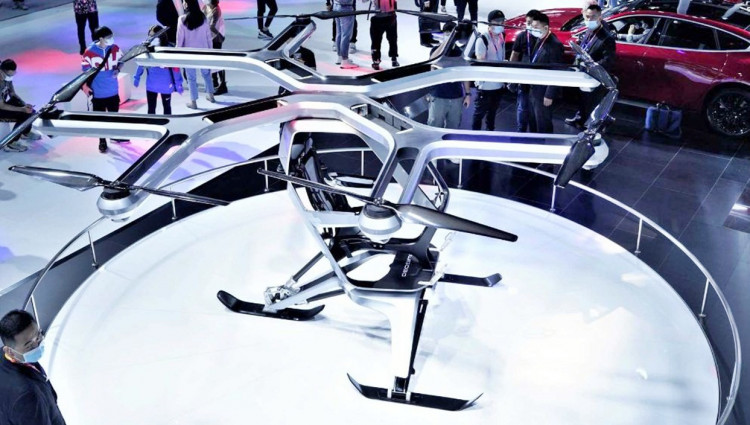Chinese electric vehicle (EV) startup Xpeng Motors has revealed an odd-looking electric flying car prototype it said will be the first in a long line of personal flying machines.
Xpeng, founded only in 2014 in Guangzhou, unveiled its oddly-named "Kiwigogo" flying car at the 2020 Beijing International Automotive Exhibition which opened Saturday. Kiwigogo is capable of carrying two persons and draws power from eight turbofans.
The vehicle looks like an upsized lat pulldown machine used in gyms for exercises. Kiwigogo can reach modest altitudes ranging from 5 to 25 meters (16 to 82 feet).
Xpeng said Kiwigogo is the first in a series of electric flying vehicles it's developing as part of a long-term research and development that includes research into mapping technologies.
Kiwigogo was developed by Xpeng Heitech, which is majority owned by He Xiaopeng, CEO of Xpeng Motors. Kiwigogo was partly funded by $1.7 billion Xpeng sold at a New York stock sale last month. He said Xpeng Heitech is developing a flying car to boost its research into mobility, electrification and digitalization.
"We think in the future not only electric vehicles will have the smart mobility autonomous driving features, but with other technology, enable other devices that can create a multi-dimensional ecosystem, that will be very exciting," said Brian Gu, vice chairman and president of Xpeng. "That's why we are investing in that area, and doing some exploration."
In a statement, Xpeng said its efforts in electric air-enabled mobility will remain focused on research and development and experimental designs for the present. It said it will evaluate prospects in the space in details before proceeding with any substantial investment in this area.
Kiwigogo is in its seventh year of development and has 15 proprietary intellectual property right patents. The company said Kiwigogo has flown about 10,000 test flights to gauge its safety. it warned Kiwigogo won't be entering service any time soon.
Xpeng also clarified its venture into air mobility won't diminish its focus on its core business, which is making EVs. It launched its first production model, the Xpeng G3 intelligent mini-SUV, in 2018. It began selling the second model, the P7 four-door electric sedan, last April.
Xpeng said its Xpeng Heitech subsidiary is part of its long-term research and development program. Flying cars won't have any material impact on Xpeng's current business. The company said its efforts in electric air-enabled mobility will remain focused on R&D and experimental designs.






